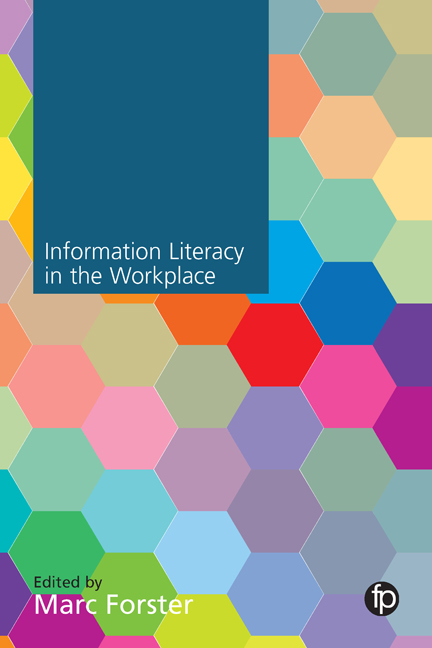Book contents
- Frontmatter
- Contents
- Figures and tables
- Contributors
- Foreword
- 1 Information Literacy and the workplace: new concepts, new perspectives?
- 2 How is Information Literacy experienced in the workplace?
- 3 Information Literacy and the personal dimension: team players, empowered clients and career development
- 4 From transaction to transformation: organizational learning and knowledge creation experience within Informed Systems
- 5 Virtuality at work: an enabler of professional Information Literacy
- 6 Determining the value of Information Literacy for employers
- 7 Information Literacy's role in workplace competence, ‘best practice’ and the ethics of professional obligation
- 8 Learning within for beyond: exploring a workplace Information Literacy design
- 9 Developing information professional competences in disciplinary domains: a challenge for higher education
- 10 The ‘hidden’ value of Information Literacy in the workplace context: how to unlock and create value
- 11 The ‘Workplace Experience Framework’ and evidence-based Information Literacy education
- References
- Index
7 - Information Literacy's role in workplace competence, ‘best practice’ and the ethics of professional obligation
Published online by Cambridge University Press: 08 June 2018
- Frontmatter
- Contents
- Figures and tables
- Contributors
- Foreword
- 1 Information Literacy and the workplace: new concepts, new perspectives?
- 2 How is Information Literacy experienced in the workplace?
- 3 Information Literacy and the personal dimension: team players, empowered clients and career development
- 4 From transaction to transformation: organizational learning and knowledge creation experience within Informed Systems
- 5 Virtuality at work: an enabler of professional Information Literacy
- 6 Determining the value of Information Literacy for employers
- 7 Information Literacy's role in workplace competence, ‘best practice’ and the ethics of professional obligation
- 8 Learning within for beyond: exploring a workplace Information Literacy design
- 9 Developing information professional competences in disciplinary domains: a challenge for higher education
- 10 The ‘hidden’ value of Information Literacy in the workplace context: how to unlock and create value
- 11 The ‘Workplace Experience Framework’ and evidence-based Information Literacy education
- References
- Index
Summary
This chapter will discuss:
• how being information-literate in the workplace is to be ethical. The ethically information-literate employee seeks to develop their knowledge to a level which allows them to most effectively address the needs of patient, customer or client. Not to be information-literate may result in harmful outcomes.
• how this exhibits itself in IL's role in the achievement of competence, and beyond this in the quest for ‘best practice’: the most effective and efficient way to achieve the best outcome for patients or clients, based on all relevant information effectively analysed and integrated into the knowledge base.
Introduction
As is well known, IL is often ignored, or regarded as a preoccupation only of librarians, or something only relevant in academic settings. How can we persuade businesses and organizations, professionals and other workers of its necessity? In fact, IL has a particular key role to play in work life that is arguably more fundamental than any other discussed in this book: an ethical role.
This chapter discusses the idea of the necessity of IL in the workplace. That is, its ethical necessity, which is found in the requirement of professionals, indeed all employees, to operate at maximum effectiveness for the highest possible safety and benefit of customers, patients and clients (Forster, 2013). In the information-rich modern workplace, this effectiveness requires the optimum search/differentiation, critique and application of all relevant information. An ill-informed professional is a potentially incompetent, even dangerous, one. A professional who has failed to develop, or sought to develop and maintain, the ability to identify information lack, search for and identify all relevant information and critique it in order to maintain professional knowledge levels, and practises from that incomplete knowledge base, is practising unethically.
This is not a common way of looking at IL's role and value. However, there is little question that its wider adoption and promotion by librarians would further strengthen its profile, and help increase an awareness of its proper value in the workplace.
Awareness of Information Literacy's vital role
This chapter's origins can be traced to something unexpected in the IL experiences of a representative sample of professional workers.
- Type
- Chapter
- Information
- Information Literacy in the Workplace , pp. 85 - 96Publisher: FacetPrint publication year: 2017
- 1
- Cited by



